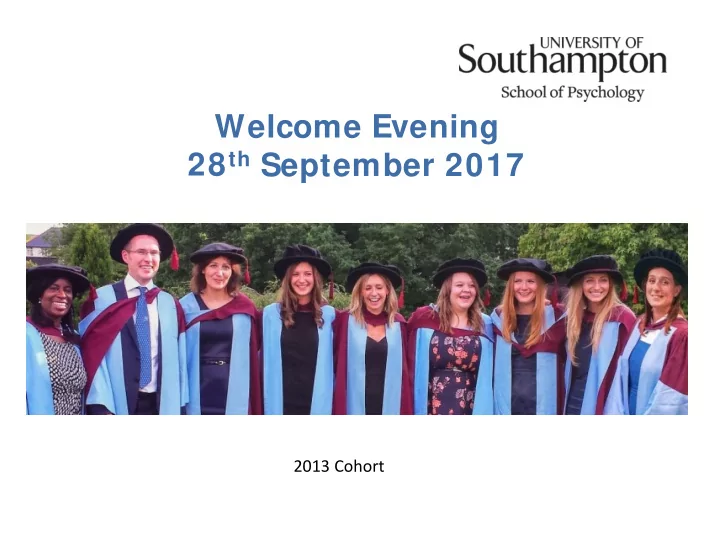

Welcome Evening 28 th September 2017 2013 Cohort
4.00 - 4.20 Day in the life of an EP Hayley, Jo and Sarah 4.20 - 4.30 Brief Course overview Sarah Wright 4.30 - 4.40 Research at Southampton Hanna Kovshoff 4.40 - 5.00 Day in life of a TEP Leanne, Nikki and Kate 5.00 - 5.10 Application & Selection Sarah Wright 5.10 - 5.20 Break 5.20 - 6.00 General Q and A All
CORE AIMS • to train you as educational psychologists to work to the highest educational, professional and ethical standards of practice. • to promote an inclusive approach to professional practice and encourage you to identify and build on the strengths children, young people, and those who work with them. • to equip you with the psychological and research skills needed to both deliver a professional service and to contribute to the knowledge base of the profession .
Year 1 overview • Placement with a field tutor for a day and a half a week • University for 2 and a half days a week • A range of assessment tasks that aim to reflect the broad range of activities in which educational psychologists are engaged in their practice http://blog.soton.ac.uk/edpsych/
Year 2 overview Placement in a Local Authority for 3 days a week • Input on most Mondays • Diversity Placement • Autism Berkshire • Barnardo's • Bournemouth LAC and care leavers teams • CAHMS • Gypsy, Roma & Traveller Teaching and Learning Provision • Southampton Hospital School • Youth Emotional Support service • Youth Offending Service • Assignments •
Year 3 overview • Placement in a Local Authority for 3 days a week • University input on 8 Mondays • Thesis • 20,000 words: systematic review and empirical paper
Research at Southampton Year 1 • Small Scale Research Project (SSRP) – Local authority commissioned research – Conducted in small groups • MSc Level Research Training Modules with all PGR and PGT students • PGR conference
Research at Southampton Years 2&3 • Thesis – 20,000 word thesis consisting of a systematic review and an empirical project – Thesis topic chosen by trainees in area of research interest/supervision expertise – Focus on Dissemination – PGR conference
2014 intake Thesis titles – some examples Intervening effectively at home and in school to improve children’s social, emotional and behavioural outcomes: An evaluation of Nurture Group and attachment-based approaches The impact of attributions and implicit theories on the understanding and management of challenging behaviour in schools Story Links: An exploration of parents', children's and facilitators' perceptions of a collaborative storytelling intervention The Impact of Belonging on Academic Achievement Evaluating the effectiveness of phonics as a method for teaching reading to children and young people who experience intellectual disabilities Does the quality of relationship between twins moderate the association between their classroom placement and their social adjustment at school entry? Exploring the inter-relationship between anxiety, spouse, perceptions, interpretation bias, and parenting factors in military Understanding the experience of social anxiety in adolescent girls with Autism Spectrum Disorders Exploring the influence of the teacher on support for pupils with selective mutism
Whole Cohort Days 2017-18
Selection • The annual intake at Southampton for a 2018 start date will be 14 funded trainees. We do not accept self-funding trainees. • You need at least a 2:1 in psychology (or equivalent) and Graduate Basis for Chartered membership (GBC) with the BPS at the time of application. If you do not have a 2:1 you have a Masters with a significant psychology component at Merit level. • Sustained and relevant work with children in education, childcare, or community settings. A minimum of 1 year's full time (or equivalent part-time) at the time of application. This can be all paid employment or at least nine months full time paid and 3 months voluntary relevant experience. This experience should enable you to demonstrate acquisition of the Common Core of Skills and Knowledge for the Children and Young People’s Workforce (CWDC 2010):
• You have provided evidence that you have kept psychology as an on-going interest and a regular part of your CPD. • Your application must show strong evidence of the application of psychology in working with children and young people. • Your application must evidence an understanding of the role of the Educational Psychologist and the contexts within which they work; identifying skills and competencies you may already have. • Your application should evidence skills and knowledge which make you a suitable candidate to study at doctoral level.
In summary someone who demonstrates: • Theoretical and research knowledge in psychology. • An ability to listen and be empathic; to respect others' cultures, experiences, values, points of view, goals and desires, fears, etc. • Good problem-solving ability, critical thinking skills, organized reasoning, intellectual curiosity and flexibility. • An ability to tolerate and understand ambiguity, uncertainty, and interpersonal conflict.
• An ability to communicate ideas, feelings and information. • The ability to examine and consider their own motives, attitudes and behaviours, and the effects of these on others. • A strong work ethic and motivation to learn, personal organization, punctuality and timeliness.
https://www.gov.uk/educational-psychology- funded-training-scheme AEP – www.aep.org.uk/training The online application system is expected to open on 1 st October 2017 Reference deadline – 29 th November 2017 Application deadline – 6 th December 2017
Recommend
More recommend